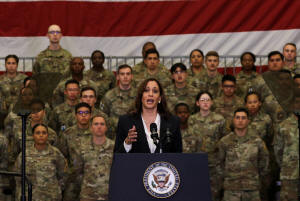U.S. will not conduct direct ascent anti-satellite missile tests, Harris
says
 Send a link to a friend
Send a link to a friend
 [April 19, 2022]
By Nandita Bose and Joey Roulette [April 19, 2022]
By Nandita Bose and Joey Roulette
WASHINGTON (Reuters) - The United States
will announce on Monday that it will not conduct a type of
anti-satellite (ASAT) missile test, after recently criticizing a similar
test by Russia for endangering the International Space Station with
debris.
U.S. Vice President Kamala Harris, who chairs the National Space
Council, will make the announcement of a self-imposed U.S. ban at the
Vandenberg Space Force Base in California.
The ban, first of its kind by a nation, is part of the Biden
administration's strategy to promote responsible use of space, and
Harris will urge other nations to follow suit.
"This commitment addresses one of the most pressing threats to the
security and sustainability of space, as demonstrated by Russia's
November 2021 destructive direct ascent ASAT missile test. The People's
Republic of China conducted a similar test in 2007," the White House
said in a statement, describing the nature of Harris's announcement on
Monday.
Russia on Nov. 15 test-launched an anti-satellite missile that struck a
defunct Soviet-era spy satellite in low-Earth orbit, creating at least
1,632 pieces of space debris, according to a U.S. Space Force database
of orbital objects.

U.S. Secretary of State Anthony Blinken condemned the test at the time
as "reckless and irresponsible," as the debris field posed risks to
active satellites in orbit and forced into shelter U.S. astronauts
aboard the International Space Station, an orbital research laboratory
managed primarily by NASA and Russia's space agency Roscosmos.
The announcement also comes amid increased U.S. intelligence cooperation
with Ukraine as Russia's invasion drags on.
[to top of second column]
|

U.S. Vice President Kamala Harris speaks during her visit to
Vandenberg Space Force Base in Lompoc, California, U.S. April 18,
2022. REUTERS/Mike Blake
 Western experts have been concerned
that space based intelligence satellites could be targeted and shot
down by Russia amid the conflict.
The White House said the debris created by these tests now threaten
satellites and other space objects that are vital to all nations'
security, economic, and scientific interests, and increases risk to
astronauts in space.
The United States first signaled its support for an anti-satellite
weapon test ban in December.
The United States, China and India are the only other countries that
have created orbital debris from anti-satellite weapon tests in the
past, with China's lone demonstration in 2007 spawning the largest
swarm of debris.
"Conflict or confrontation in outer space is not inevitable, and the
United States seeks to ensure outer space remains free from
conflict," the White House statement said.
"The ... administration had made clear that the United States will
engage the international community to uphold and strengthen a
rules-based international order for space."
(Additional reporting by Mike Stone in Washington; Editing by Himani
Sarkar)
[© 2022 Thomson Reuters. All rights
reserved.] This material may not be published,
broadcast, rewritten or redistributed.
Thompson Reuters is solely responsible for this content.
 |